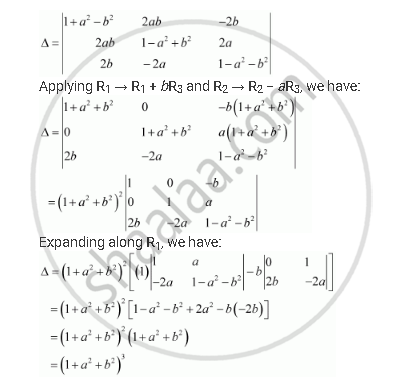Advertisements
Advertisements
Question
By using properties of determinants, show that:
`|(1+a^2-b^2, 2ab, -2b),(2ab, 1-a^+b^2, 2a),(2b, -2a, 1-a^2-b^2)| = (1+a^2+b^2)`
Solution

APPEARS IN
RELATED QUESTIONS
If ` f(x)=|[a,-1,0],[ax,a,-1],[ax^2,ax,a]| ` , using properties of determinants find the value of f(2x) − f(x).
Using the property of determinants and without expanding, prove that:
`|(a-b,b-c,c-a),(b-c,c-a,a-b),(a-a,a-b,b-c)| = 0`
By using properties of determinants, show that:
`|(1,1,1),(a,b,c),(a^3, b^3,c^3)|` = (a-b)(b-c)(c-a)(a+b+c)
By using properties of determinants, show that:
`|(x,x^2,yz),(y,y^2,zx),(z,z^2,xy)| = (x-y)(y-z)(z-x)(xy+yz+zx)`
By using properties of determinants, show that:
`|(x+4,2x,2x),(2x,x+4,2x),(2x , 2x, x+4)| = (5x + 4)(4-x)^2`
Using properties of determinants, prove that:
`|(x, x^2, 1+px^3),(y, y^2, 1+py^3),(z, z^2, 1+pz^2)|` = (1 + pxyz) (x – y) (y – z) (z – x), where p is any scalar.
Using propertiesof determinants prove that:
`|(x , x(x^2), x+1), (y, y(y^2 + 1), y+1),( z, z(z^2 + 1) , z+1) | = (x-y) (y - z)(z - x)(x + y+ z)`
Using properties of determinants, prove that:
`|[a^2 + 1, ab, ac], [ba, b^2 + 1, bc ], [ca, cb, c^2+1]| = a^2 + b^2 + c^2 + 1`
Using properties of determinants, prove that:
`|[a^2 + 1, ab, ac], [ba, b^2 + 1, bc ], [ca, cb, c^2+1]| = a^2 + b^2 + c^2 + 1`
Solve for x : `|("a"+"x","a"-"x","a"-"x"),("a"-"x","a"+"x","a"-"x"),("a"-"x","a"-"x","a"+"x")| = 0`, using properties of determinants.
Without expanding evaluate the following determinant:
`|(1, "a", "b" + "c"),(1, "b", "c" + "a"),(1, "c", "a" + "b")|`
If `|(4 + x, 4 - x, 4 - x),(4 - x, 4 + x, 4 - x),(4 - x, 4 - x, 4 + x)|` = 0, then find the values of x.
Without expanding the determinant, find the value of `|(10, 57, 107),(12, 64, 124),(15, 78, 153)|`.
By using properties of determinants, prove that `|(x + y, y + z, z + x),(z, x, y),(1, 1, 1)|` = 0.
Without expanding the determinants, show that `|(x"a", y"b", z"c"),("a"^2, "b"^2, "c"^2),(1, 1, 1)| = |(x, y, z),("a", "b", "c"),("bc", "ca", "ab")|`
Without expanding evaluate the following determinant:
`|(2, 7, 65),(3, 8, 75),(5, 9, 86)|`
Prove that `|(x + y, y + z, z + x),(z + x, x + y, y + z),(y + z, z + x, x + y)| = 2|(x, y, z),(z, x, y),(y, z, x)|`
If `|(4 + x, 4 - x, 4 - x),(4 - x,4 + x,4 - x),(4 - x,4 - x, 4 + x)|` = 0, then find the values of x.
Without expanding determinants show that
`|(1, 3, 6),(6, 1, 4),(3, 7, 12)| + 4|(2, 3, 3),(2, 1, 2),(1, 7, 6)| = 10|(1, 2, 1),(3, 1, 7),(3, 2, 6)|`
Select the correct option from the given alternatives:
The determinant D = `|("a", "b", "a" + "b"),("b", "c", "b" + "c"),("a" + "b", "b" + "c", 0)|` = 0 if
Select the correct option from the given alternatives:
Let D = `|(sintheta*cosphi, sintheta*sinphi, costheta),(costheta*cosphi, costheta*sinphi, -sintheta),(-sintheta*sinphi, sintheta*cosphi, 0)|` then
Select the correct option from the given alternatives:
The system 3x – y + 4z = 3, x + 2y – 3z = –2 and 6x + 5y + λz = –3 has at least one Solution when
Answer the following question:
Evaluate `|(2, 3, 5),(400, 600, 1000),(48, 47, 18)|` by using properties
Evaluate: `|(x^2 - x + 1, x - 1),(x + 1, x + 1)|`
Evaluate: `|("a" + x, y, z),(x, "a" + y, z),(x, y, "a" + z)|`
Evaluate: `|(3x, -x + y, -x + z),(x - y, 3y, z - y),(x - z, y - z, 3z)|`
If A + B + C = 0, then prove that `|(1, cos"c", cos"B"),(cos"C", 1, cos"A"),(cos"B", cos"A", 1)|` = 0
If `[(4 - x, 4 + x, 4 + x),(4 + x, 4 - x, 4 + x),(4 + x, 4 + x, 4 - x)]` = 0, then find values of x.
If A, B and C are angles of a triangle, then the determinant `|(-1, cos"C", cos"B"),(cos"C", -1, cos"A"),(cos"B", cos"A", -1)|` is equal to ______.
If x = – 9 is a root of `|(x, 3, 7),(2, x, 2),(7, 6, x)|` = 0, then other two roots are ______.
Using properties of determinants `abs ((1, "a", "a"^2 - "bc"),(1, "b", "b"^2 - "ca"),(1, "c", "c"^2 - "ab")) =` ____________.
In a third order matrix B, bij denotes the element in the ith row and jth column. If
bij = 0 for i = j
= 1 for > j
= – 1 for i < j
Then the matrix is
A number consists of two digits and the digit in the ten's place exceeds that in the unit's place by 5. If 5 times the sum of the digits be subtracted from the number, the digits of the number are reversed. Then the sum of digits of the number is:
Which of the following is correct?
If A, B and C are the angles of a triangle ABC, then `|(sin2"A", sin"C", sin"B"),(sin"C", sin2"B", sin"A"),(sin"B", sin"A", sin2"C")|` = ______.
By using properties of determinant prove that `|(x+y,y+z,z+x),(z,x,y),(1,1,1)|` = 0
Without expanding determinant find the value of `|(10,57,107),(12,64,124),(15,78,153)|`
Without expanding evaluate the following determinant.
`|(1, a, b+c),(1, b, c+a),(1, c, a+b)|`
Without expanding determinant find the value of `|(10, 57, 107),(12, 64, 124),(15, 78, 153)|`
